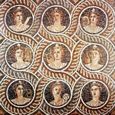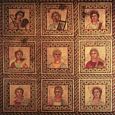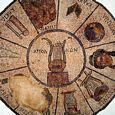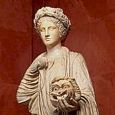THALEIA
Greek Name
Θαλεια
Transliteration
Thaleia
Latin Spelling
Thalia
Translation
Festivity, Blooming
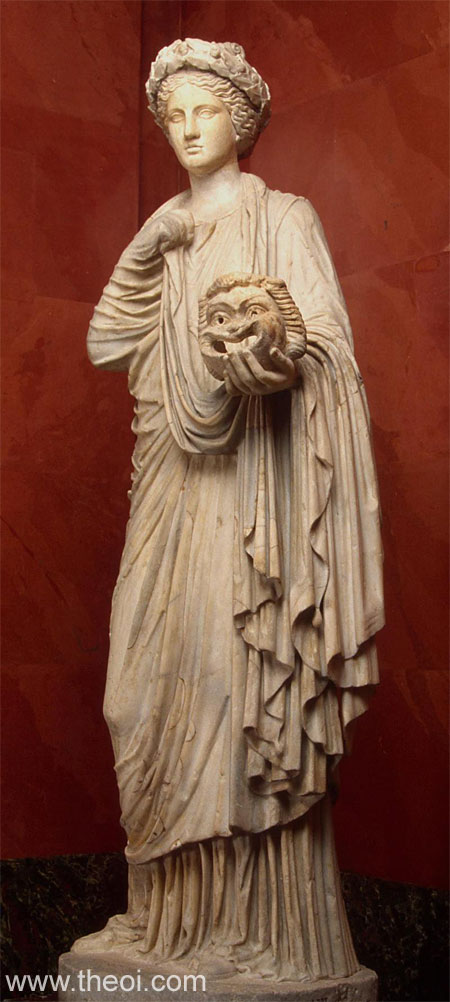
THALEIA (Thalia) was one of the nine Mousai (Muses), the goddesses of music, song and dance. In the Classical era, when the Mousai were assigned specific artistic and literary spheres, Thaleia was named Muse of comedy and bucolic poetry. In this guise she was portrayed with the attributes of comic mask, shepherd's staff and wreath of ivy. Her name was derived from the Greek word thaleia meaning "rich festivity" or "blooming."
FAMILY OF THALIA
PARENTS
ZEUS & MNEMOSYNE (Hesiod Theogony 75, Apollodorus 1.13, Diodorus Siculus 4.7.1, Orphic Hymn 76)
OFFSPRING
THE KORYBANTES (by Apollon) (Apollodorus 1.18)
ENCYCLOPEDIA
THALEIA or THALIA (Thaleia, Thalia). One of the nine Muses. and, at least in later times, regarded as the Muse of Comedy. (Hes. Theog. 77.) She became the mother of the Corybantes by Apollo. (Apollod. i. 3. § 4; Plut. Sympos. ix. 14.)
Source: Dictionary of Greek and Roman Biography and Mythology.
CLASSICAL LITERATURE QUOTES
Hesiod, Theogony 75 ff (trans. Evelyn-White) (Greek epic C8th or C7th B.C.)
:
"The Mousai (Muses) sang who dwell on Olympos, nine daughters begotten by great Zeus, Kleio (Clio) and
Euterpe, Thaleia (Thalia), Melpomene and Terpsikhore (Terpsichore), and Erato and Polymnia (Polyhymnia) and
Ourania (Urania) and Kalliope (Calliope)."
Aristophanes, Birds 737 ff (trans. O'Neill) (Greek comedy C5th to 4th B.C.)
:
"[A bird singing in a comedy-play :] Oh, Mousa Iokhmaia (Rustic Muse, Muse of the Coppice) of such varied
note, tiotiotiotiotiotinx, I [a bird] sing with you in the groves and on the mountain tops, tiotiotiotinx. I
poured forth sacred strains from my golden throat in honour of the god Pan, tiotiotiotinx, from the top of the
thickly leaved ash, and my voice mingles with the mighty choirs who extol Kybele (Cybele) on the mountain tops,
totototototototototinx."
Pseudo-Apollodorus, Bibliotheca 1. 13 (trans. Aldrich) (Greek mythographer C2nd A.D.)
:
"Mnemosyne [bore to Zeus] the Mousai (Muses), the eldest of whom was Kalliope (Calliope), followed by Kleio
(Clio), Melpomene, Euterpe, Erato, Terpsikhore (Terpsichore), Ourania (Urania), Thaleia (Thalia), and
Polymnia."
Pseudo-Apollodorus, Bibliotheca 1. 18 :
"Apollon and Thaleia (Thalia) had the Korybantes (Corybantes)."
Diodorus Siculus, Library of History 4. 7. 1 (trans. Oldfather) (Greek historian C1st
B.C.) :
"Hesiod even gives their [the Mousai's (Muses')] names when he writes : ‘Kleio (Clio), Euterpe, and
Thaleia (Thalia), Melpomene, Terpsikhore (Terpsichore) and Erato, and Polymnia, Ourania (Urania), Kalliope
(Calliope) too, of them all the most comely.’
To each of the Mousai (Muses) men assign her special aptitude for one of the branches of the liberal arts, such
as poetry, song, pantomimic dancing, the round dance with music, the study of the stars, and the other liberal
arts . . . For the name of each Mousa (Muse), they say, men have found a reason appropriate to her: . . .
Thaleia (Thalia), because men whose praises have been sung in poems flourish (thallein) through long
periods of time."
Orphic Hymn 76 to the Muses (trans. Taylor) (Greek hymns C3rd B.C. to 2nd A.D.)
:
"Daughters of Mnemosyne and Zeus . . . Kleio (Clio), and Erato who charms the sight, with thee, Euterpe,
ministering delight : Thalia flourishing, Polymnia famed, Melpomene from skill in music named : Terpsikhore
(Terpsichore), Ourania (Urania) heavenly bright."
Statius, Silvae 2. 1. 114 ff (trans. Mozley) (Roman poetry C1st A.D.) :
"If in Grecian dress he declaimed the Attic speech of fluent Menander [the writer of comedies], Thalia
[muse of comedy] would have rejoiced and praised his accents, and in wanton mood have disordered his comely
locks with a rosy garland."
ANCIENT GREEK & ROMAN ART
SOURCES
GREEK
- Hesiod, Theogony - Greek Epic C8th - 7th B.C.
- Aristophanes, Birds - Greek Comedy C5th - 4th B.C.
- Apollodorus, The Library - Greek Mythography C2nd A.D.
- Diodorus Siculus, The Library of History - Greek History C1st B.C.
- The Orphic Hymns - Greek Hymns C3rd B.C. - C2nd A.D.
ROMAN
- Statius, Silvae - Latin Poetry C1st A.D.
OTHER SOURCES
Other references not currently quoted here: Plutarch Table-Talk 9.14.
BIBLIOGRAPHY
A complete bibliography of the translations quoted on this page.
